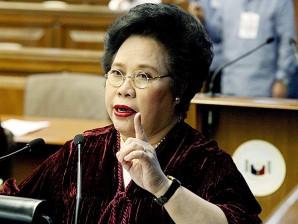The threat to charge 159 faculty members of the Ateneo de Manila University with heresy for expressing support for the reproductive health bill (RH) is an infringement of their constitutional right to academic freedom, which is also recognized by Vatican II, according to Sen. Miriam Santiago.
“Academic freedom is enshrined in our Constitution. You cannot dictate to a professor what to teach. I think this is a backward-looking message,” Santiago reminded the Ateneo management and the Catholic Bishops Conference of the Philippines (CBCP), which had warned the faculty members they face possible charges of heresy.
Santiago said the Vatican II ecumenical council already defined the changing role of the Catholic Church and society.
“You can no longer punish Catholics for their freedom of conscience… That’s why it was called an ecumenical council because it abandoned all its previous strict conservative ways and is now more open to what can be called questioning concern,” said Santiago, a constitutional expert who has a master’s degree in theology.
RH backer
The senator is one of the most vocal supporters of the RH bill in the Senate. Santiago, in fact, filed the first RH bill in the Senate in 1997.
The CBCP earlier called on Ateneo authorities to investigate the 159 faculty members who signed a declaration of support for the RH bill for allegedly going against Catholic dogma.
The Catholic hierarchy, the most vocal opponents of the RH bill, resists the idea of the government distributing artificial methods of contraception to poor Filipinos. Condoms and birth control pills are particularly anathema as they supposedly encourage promiscuity, especially among the young.
Ateneo president Fr. Jose Ramon Villarin, who supports the CBCP position, wrote a letter to the Ateneo community that was posted on the university’s website, telling those “engaged in the Christian formation of our students to ensure that the Catholic position on this matter continues to be taught in our classes, as we have always done.”
Wrong theology
Santiago said the Ateneo and the CBCP are not allowed “to downtrod the academic freedom of all intellectuals of the country… To threaten these (faculty members that they) would be kicked out of the Catholic Church is in effect to impose sanctions on academic freedom.”
“This is wrong theology because there is no dogma involved here, there is no specific dogmatic principle that has emanated from the Pope,” she reiterated.
Only Pope Benedict XVI “can dictate” Catholic dogma “and that is only when he categorically claims that he is speaking ex cathedra in his role as Supreme Pontiff.”
“The Pope never exercised that power with respect to reproductive health or population control or responsible parenthood so we are all agreed among the Catholic theological community that this is not a required position,” the senator said.
Party-list representative Luz Ilagan (Gabriela), who taught at the Ateneo de Davao for four decades, said it was the Ateneo professors’ right to make a stand on an important issue.
“That they view the RH bill as a piece of legislation that will help provide much-needed maternal and infant health services to Filipinos is a laudable demonstration of compassion, social awareness and a commitment for the poor and the marginalized,” Ilagan said in a statement.
True to Ateneo mission
The professors, in taking a stand for the bill, were also being true to the Ateno’s mission statement of social concern by being men and women for others, she said.
Albay Rep. Edcel Lagman, one of the bill’s principal authors, said the Ateneo professors’ support for the bill does not go against Catholic dogma.
“[It] does not offend or reject Catholic dogma because it adheres to the hallmark of the measure on the right to informed choice, which negates both compulsion and reward, and promotes free will which is a cardinal principle of the Church,” Lagman said in a statement.
He said academic freedom as provided for in the Constitution extends to professors of Catholic universities. The essence of such a freedom also includes searching for truth in various disciplines and revealing this, unhampered by prior restraint or reprisal from authorities.
Lagman also said that since bishops and their supporters invoke freedom of expression in opposing the reproductive health bill, the Ateneo professors should also be given the same freedom to support the measure in good conscience as Catholics.
